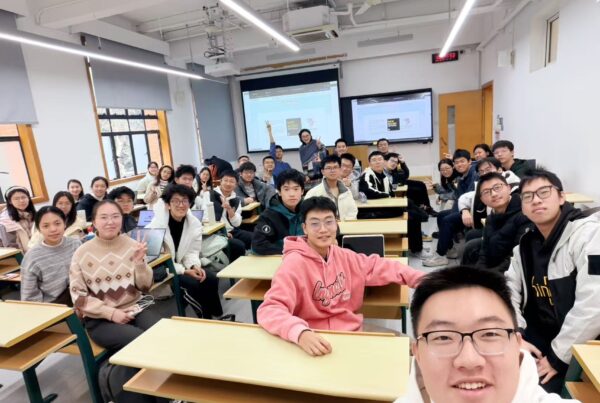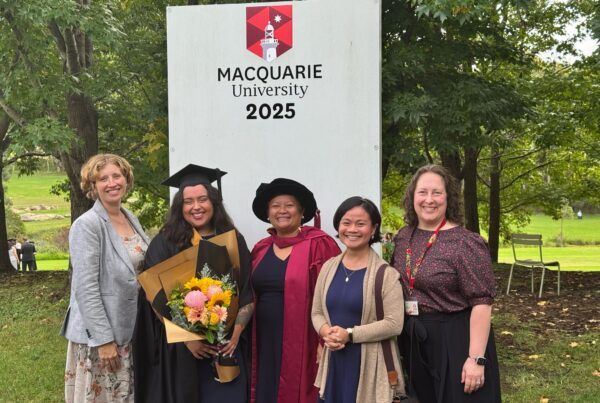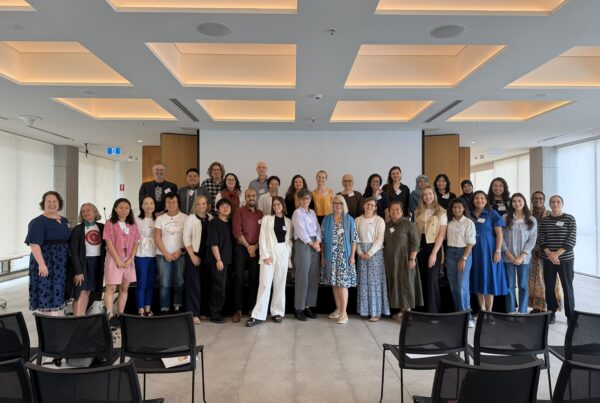 Get ready for another exciting series of events related to linguistic diversity at Macquarie University! This term, our series includes not only lectures by international experts but also a conference, workshops and a book launch. With these events, we will be celebrating 10 years of Language on the Move! Please make sure to join us throughout the semester, as we mark our first 10 years of innovative research, dissemination and fun related to intercultural communication, language learning and multilingualism in the context of globalization and migration.
Get ready for another exciting series of events related to linguistic diversity at Macquarie University! This term, our series includes not only lectures by international experts but also a conference, workshops and a book launch. With these events, we will be celebrating 10 years of Language on the Move! Please make sure to join us throughout the semester, as we mark our first 10 years of innovative research, dissemination and fun related to intercultural communication, language learning and multilingualism in the context of globalization and migration.
Program
- Tuesday, August 13, 1:00-2:30pm, AHH 1.602
Helen Fraser, University of New England, “Translation of forensic audio recordings” - Tuesday, August 27, 1:00-2:30pm, AHH 1.602
Leonie Schulte, University of Oxford, “Speaking Germanness: Ideologies of linguistic belonging and translingual practices on the margins” - Friday, September 20, 9:00-10:00, Level 8, 21 Wally’s Walk
Ingrid Piller, “Language and Migration” – Keynote lecture as part of the Croatia and Croatians in Past and Present Networks Conference - Wednesday, October 2, 11:00-12:30pm, AHH 1.602
Anke Grotlüschen, Hamburg University, “Political Efficacy and Social Trust: Why Literacy Programs Shouldn’t Focus Only on Employability” - Mystery date in October
Book launch of Hanna Torsh, Linguistic Intermarriage in Australia: Between pride and shame, Winner of Australian Linguistics Society’s 2019 Michael Clyne Prize - Wednesday, November 20, TBA
Ingrid Gogolin, Hamburg University, “Multilingual language proficiency development over time” - Friday, November 22 – Sunday, November 24
Sharing Knowledge in the Spirit of Humboldt Conference [Save the date; registration information to follow soon] - December 11-13, Australian Linguistics Society 2019 Annual Conference, Themed Panels
- Loy Lising, “Linguistic diversity in Australian migrant families”
- Alexandra Grey and Laura Smith-Khan, “Linguistic diversity as a challenge to legal policy in Australia”
Translation of forensic audio recordings
Helen Fraser, University of New England
Abstract: Linguists with a background in intercultural communication often have strong concerns about social justice. For some, these concerns draw them to topics related to language in the law. Examples include: ensuring witnesses from linguistically diverse backgrounds get a fair hearing in court, or that language tests used to determine the origin of asylum seekers are valid and applied fairly, or that suspects understand their right to remain silent during a police interview. This presentation looks at a related but significantly different task that those who know multiple languages are increasingly asked to engage in: transcription and translation of audio recordings used as evidence in criminal trials. Using examples from real cases, Dr Fraser will outline how forensic recordings are used in court, describe some problems that can arise, and introduce the solutions currently being recommended by Australian forensic linguists. For an (optional) introduction to some of the issues, please visit forensictrancription.com.au
Speaking Germanness: Ideologies of linguistic belonging and translingual practices on the margins
Leonie Schulte, University of Oxford
Abstract: This presentation investigates the ideological underpinnings of linguistic belonging in contemporary Germany, through an exploration of the experiences and linguistic strategies of migrants and refugees enrolled in state-operated language-integration courses. Germany’s National Integration Plan (2007) presents German language acquisition as the “key” to migrant and refugee integration, and the successful completion of state-funded language courses for newcomers is a requirement for their access to both the job and education markets, as well as citizenship and residence permits. Furthermore, the acquisition of German language skills is centrally linked to popular and political notions of success, social mobility, financial security, independence, and more broadly, to notions of integratability and belonging. Drawing on 15 months of ethnographic fieldwork in Berlin, Germany, I examine the ways in which participants of the language-integration classroom negotiate linguistic belonging, both through fixed classroom curriculums, and fluid, multilingual interaction. I find that the place of Standard German as the key to successful integration is so pervasive in classroom discourse that teachers often overlook or disregard the role that other, non-standard or multilingual linguistic practices play for migrants and refugees, who often live in diverse communities. At the same time, the linguistic diversity of the classroom community means that translingual exchanges are central to students’ informal strategies of information exchange, identity performance and group formation. These linguistic practices allow students to bypass and even subvert the strict classroom structure. Humour, boredom, frustration and ambition are often articulated through translingual exchanges within the margins of classroom interaction.
Political Efficacy and Social Trust: Why Literacy Programs Shouldn’t Focus Only on Employability
Anke Grotlüschen, Hamburg University
Abstract: The large-scale findings from PIAAC (Program for the International Assessment of Adult Competencies) offer more than knowledge about economic outcomes of high/low literacy proficiency. They also provide data on political efficacy, social trust and volunteering. Political efficacy is a construct that indicates democratic participation and asks for individuals’ feelings on whether they can influence politics. Social trust indicates social cohesion and asks whether individuals trust their co-citizens as well as social institutions. Thus, our research questions are: What do low literate groups think about their political efficacy, how strongly do they trust in their society, and how often are they involved in volunteering? Our theoretical assumptions do not conceptualize people in terms of human capital or rational choice. Political engagement and social cohesion correlate with the belief in a fair society. Two French intellectuals, Rancière and Rosanvallon, point to massive disruptions of social cohesion. Economists like Piketty call for new models of distribution to improve shared use of the commons. We conclude that politically extreme choices are made in societies that lack a belief in communality and justice. Social trust is low amongst low literate groups and volunteering seems a weak strategy for integrating low-literate adults. Their feelings of political efficacy hint at a certain disengagement with politics. Recent literacy programs or strategies tend to focus primarily on employment and employability. The findings suggest a new task for literacy provision: empowerment and democratic participation.
Anke Grotlüschen is Professor for Lifelong Learning at Hamburg University. She oversees 4 million Euros in research grants focused on literacy, numeracy, political participation and lifelong learning. This includes two nationwide Level One Surveys (2010, 2018). She is one of six principal investigators of the Hamburg Numeracy Project.
Linguistic diversity in Australian migrant families
Themed panel at ALS conference, convened by Loy Lising
This panel aims to bring together research work on, for and with multilingual migrant families across a number of communities in Australia. The research showcased in this panel addresses a number of factors, including but not limited to, migrant families’ varied linguistic trajectories, the domains in which their languages and literacies are used in their communities, and the various language learning strategies employed in the homes and in the communities to maintain heritage languages. Moreover, they seek to uncover the social, educational, economic and institutional factors that (de)motivate current (multi)lingual practices.
The research presented will come from a range of qualitative studies and interview-based research projects that aim to tease out language and literacy practices, and the ideologies that undergird them, in migrant families from diverse language backgrounds and ancestries.
The panel’s motivation is to create a forum for understanding ongoing efforts, in multilingual migrant homes and communities, for language learning and heritage language maintenance.
Speakers include Antonia Rubino, Elizabeth Ellis, Hanna Torsh, Kerry Taylor-Leech, Loy Lising, Shiva Motaghi-Tabari, Van Tran, Vera Williams Tetteh, and Yining Wang. Discussant: Ingrid Piller
Reports about previous Lectures in Linguistic Diversity
- Bilingual children in preschool
- Secrets of bilingual parenting success
- Asylum interviews as linguistic conflict zones
- Are bilinguals better language learners?
- What do migrant parents expect from schools?
- Bilingual children refusing to speak the home language
- How can we change language habits?






 This work is licensed under a
This work is licensed under a
Join the discussion One Comment